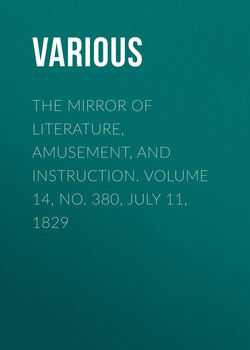Читать книгу The Mirror of Literature, Amusement, and Instruction. Volume 14, No. 380, July 11, 1829 - Various - Страница 1
MERCERS' HALL, AND CHEAPSIDE
ОглавлениеThe engraving is an interesting illustration of the architecture of the metropolis in the seventeenth century, independent of its local association with names illustrious in historical record.
In former times, when persons of the same trade congregated together in some particular street, the mercers principally assembled in West Cheap, now called Cheapside, near where the above hall stands, and thence called by the name of "the Mercery." In Lydgate's London Lyckpenny, are the following lines alluding to this custom:
Then to Chepe I began me drawne,
When much people I saw for to stand;
One offered me velvet, silk and lawne
And another he taketh me by the hand.
Here is Paris thread, the finest in the land.
Pennant thus describes the principal historical data of the spot:
"On the north side of Cheapside, (between Ironmonger Lane and Old Jewry,) stood the Hospital of St. Thomas of Acon, founded by Thomas Fitz-Theobald de Helles, and his wife Agnes, sister to the turbulent Thomas Becket, who was born in the house of his father, Gilbert, situated on this spot. The mother of our meek saint was a fair Saracen, whom his father had married in the Holy Land. On the site of this house rose the hospital, built within twenty years after the murder of Thomas; yet such was the repute of his sanctity, that it was dedicated to him, in conjunction with the blessed Virgin, without waiting for his canonization. The hospital consisted of a master and several brethren, professing the rule of St. Austin. The church, cloisters, &c. were granted by Henry VIII. to the Mercers' Company, who had the gift of the mastership.1
"In the old church were several monuments; among others, one to James Butler, Earl of Ormond, and Joan his wife, living in the beginning of the reign of Henry VI. The whole pile was destroyed in the great fire, but was very handsomely rebuilt by the Mercers' Company, who have their Hall here.
"In this chapel the celebrated, but unsteady, archbishop of Spalato, preached his first sermon in 1617, in Italian, before the Archbishop of Canterbury, and a splendid audience; and continued his discourses in the same place several times, after he had embraced our religion; but having the folly to return to his ancient faith, and trust himself among his old friends at Rome, he was shut up in the Castle of St. Angelo, where he died in 1625."
"The Mercers' Company is the first of the twelve. The name by no means implied, originally, a dealer in silks: for mercery included all sorts of small wares, toys, and haberdashery; but, as several of this opulent company were merchants, and imported great quantities of rich silks from Italy, the name became applied to the Company, and all dealers in silk. Not fewer than sixty-two mayors were of this Company, between the years 1214 and 1762; among which were Sir John Coventry, Sir Richard Whittington, and Sir Richard and Sir John Gresham."
The front in Cheapside, which alone can be seen, is narrow, but floridly adorned with carvings and architectural ornaments. The door is enriched with the figures of two cupids, mantling the arms, festoons, &c. and above the balcony, it is adorned with two pilasters, entablature, and pediment of the Ionic order; the intercolumns are the figures of Faith and Hope, and that of Charity, in a niche under the cornice of the pediment, with other enrichments. The interior is very handsome. The hall and great parlour are wainscoted with oak, and adorned with Ionic pilasters. The ceiling is of fret-work, and the stately piazzas are constituted by large columns, and their entablature of the Doric order.
The arms of the Mercers, as they are sculptured over the gateway, present for their distinguishing feature a demi-virgin with dishevelled hair: it was in allusion to this circumstance, that in the days of pageantry, at the election of Lord Mayor, a richly ornamented chariot was produced, in which was seated a young and beautiful virgin, most sumptuously arrayed, her hair flowing in ringlets over her neck and shoulders, and a crown upon her head. When the day's diversions were over, she was liberally rewarded and dismissed, claiming as her own the rich attire she had worn.
From this place likewise was formerly a solemn procession by the Lord Mayor, who, in the afternoon of the day he was sworn at the Exchequer, met the Aldermen; whence they repaired together to St. Paul's, and there prayed for the soul of their benefactor, William, Bishop of London, in the time of William the Conqueror, at his tomb. They then went to the churchyard to a place where lay the parents of Thomas â Becket, and prayed for all souls departed. They then returned to the chapel, and both Mayor and Aldermen offered each a penny.
Attached to the original foundation or hospital was a grammar-school, which has been subsequently continued at the expense of the Mercers' Company, though not on the same spot. It was for some time kept in the Old Jewry, whence it has been removed to College Hill, Upper Thames Street. Among the masters may be mentioned William Baxter, nephew to the non-conformist, Richard Baxter, and author of two Dictionaries of British and Roman Antiquities.
Nearly opposite the entrance to Mercers' Hall, is a handsome stone-fronted house, built by Sir Christopher Wren. The houses adjoining the Hall were of similar ornamental character; although the unenclosed shop-fronts present a strange contrast with some of the improvements and superfluities of modern times. The Hall front has lately been renovated, and presents a rich display of architectural ornament.
1
Tanner.
